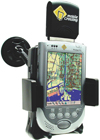
A GPS unit can be an asset when traveling by vehicle.
Men usually don't like to ask directions or pay attention to their wives' directions. For those men, I say, “Get a GPS.” GPS is short for global positioning system. For those who haven't heard of a GPS, it's a worldwide radio-navigation system that was developed by the U.S. Department of Defense. It uses satellite signals to track the location or position of vehicles or vessels on earth.
A small GPS can be purchased for around $300. It sticks to the windshield of a car or truck by a suction cup. It's very simple to operate; you don't even have to read the instructions - but it helps. Once you have it in place, it will ask you where you want to go (it reads out on the small screen). You use the touch-screen to input the address number and the street name, and then it may give you a few cities to choose from. You choose the proper city, and then a map comes up, guiding you from where you are to where you want to go. The GPS also uses a clear, lady's voice to tell you how far to go, when and where to turn (before you get to the turn). It will direct you directly to the door of where you want to go.

A GPS is not infallible, however: On a recent trip, the Cutters were directed along a route that made use of a bridge that had been closed for 20 years.
Now with the GPS, I have two women in the front seat telling me where to go. Of course, Bess and this lady's voice in the GPS usually disagree. The GPS tells me to go one way, and Bess says, “I don't think so.” After some discussion, I usually listen to the GPS. It usually gets us there by the best and shortest directions. However, a few times after traveling through directed back roads to an address, we have found the main highway would have been faster.
A GPS isn't infallible! When you miss your turn, the GPS will say “Rerouting” and may take you a long route to get you back on track. We've found that if you don't want to travel all over the country, just turn around (if possible) and go back to where you missed the turn.
Once, when entering a town, the GPS told us to turn right to our chosen motel. On the right was a large mall. After circling the mall a couple times and not locating the motel, I decided to call the motel; the phone number also was listed on the GPS screen. Looking across in the distance, I saw the motel a block away. The GPS had told me to turn right to arrive at final destination when it should have directed me to turn left to arrive at my final destination. Sometimes it lies.
While looking for a specific driller in Pennsylvania, the GPS directed us down a winding dirt road for a time and then we came to a point in the road where the bridge was out. We asked some young people riding an ATV how long the bridge had been out. They said, “More than 20 years.” We asked them how to get to this driller's address and they told us we had to go back to the highway and back in on another road. Maybe another time.

One of the benefits of a GPS is that it can accommodate excursions off an original route and modify its course based on the current location. Northern Michigan.
Occasionally, the GPS just locks up like a computer. You're driving down the highway, waiting on directions and then you discover the dumb GPS has locked up. It's just sitting there, smiling at you with this pretty map - doing nothing. At that point, you just call it a few choice words, push the Reset button and wait until it resets itself again, and then it tells you that you are off route and reroutes you.
Recently, we were traveling from Lynchburg, Va., back to Charlottesville, Va. We were taking the most direct route by instructions from the GPS. It directed us off the paved road onto a gravel road called Ferry Road. We thought it must be wrong. We followed the road for about a mile, then we came upon what I think was the James River. Yep, the GPS was right: There was the ferry, on the other side of the river - grounded for the season. We backtracked the mile to the paved road, then pressed the Detour button on the GPS and it guided us around the Ferry Road and back on track towards Charlottesville.
It's really fun to pull up to a driller's business or home unannounced, and they wonder how Porky ever found them.
A GPS is great for people who travel a lot, for salesmen, for drillers and construction workers, in that it will take them from anywhere they are to any address they want to go to. The few missteps aside, our GPS has saved us many miles and precious time locating and calling on prospects.
Most GPS units can be removed easily from their holder and carried inside your home or motel and set up for the next day's travels. They have an internal battery that is recharged while in the vehicle bracket.
We recently were in northern Michigan. When we were ready to head home, we just pressed the Home button and it guided us the best way back to Virginia Beach, Va. While headed home, we could alter our route if we liked, then push the Home button and be on the best route home from where we were at that moment.
Try a GPS if you travel by vehicle. I promise you'll wonder why you didn't utilize one sooner.



Report Abusive Comment